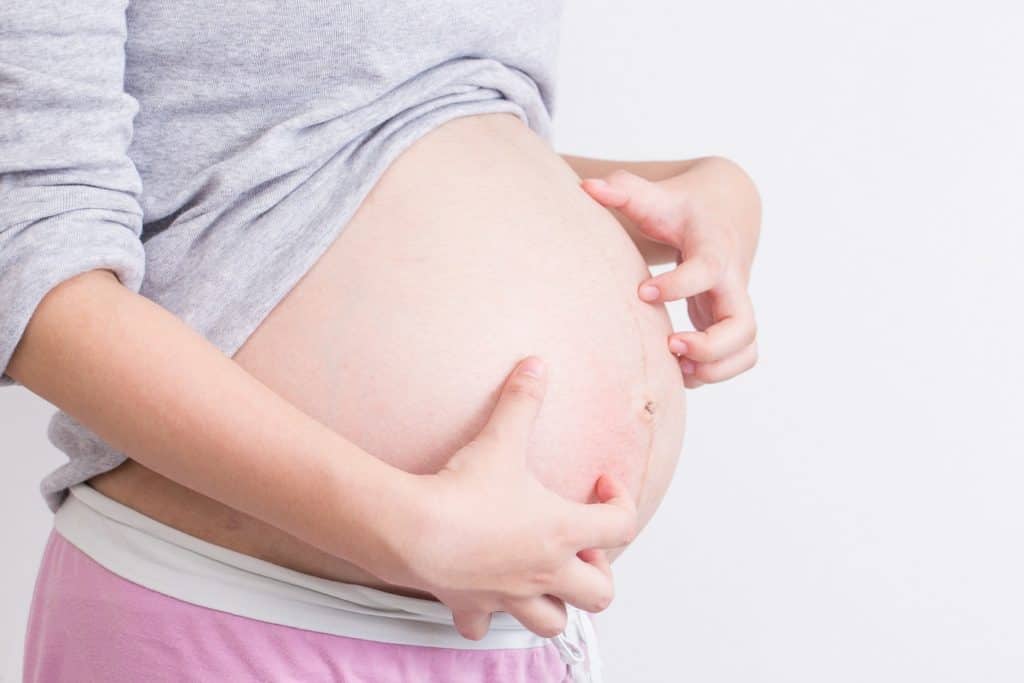
Table of Contents
Do you find any weird PUPPP pregnancy rash that has popped up in your abdomen that makes your baby bump itchy during your pregnancy? As medically reviewed these weird rashes per day are known to be the PUPPP pregnancy Rash. What does this PUPPP rash during pregnancy mean and why does it occur? Read on to know.
First and foremost, these although might be uncomfortable but aren’t dangerous to you or your baby. But then what is a PUPPP pregnancy rash?
PUPPP Pregnancy rash or PEP (polymorphic eruption of pregnancy) ?
The PUPPP itchy pregnancy rash that often shows up on the pregnant baby bump is also known as the pruritic urticarial papules and plaques of pregnancy puppp. It is annoying but benign that develops on the abdomen stretching of the skin that also appears on the thighs, buttocks, or arms generally by your third trimester.
These plaques of pregnancy are common in the first pregnancy and in those who are carrying multiples. These pruritic urticarial papules cause itching that at times become very severe and spread to the rest of the body, but fortunately not to the face and not higher to the breasts.
What does Pruritic Urticarial Papules (PUPPP) look like and how does it begin ?
The PUPPP often looks like bumpy skin lesions or skin-colored, pink, or dark bumps that look pink or red on fair skin. However, for women with more richly pigmented skin, this itchy rash may seem skin-toned or darker.
PUPPP in pregnant women according to the health information usually begins on the abdomen that spreads to the other extremities within just a few days in the patients. These small, pink pimple-like spots appear in the stretch marks that closely resemble hive-like and eventually come together and form large, red, plaque-like areas with blisters formed.
This condition of the connective tissue can spread across from the stomach to the:
- Buttocks
- Thighs
- Arms
- Legs
However, this polymorphic eruption of pregnancy tends to become even more itchy and rich during the nights that could affect your sleep as well.
What causes puppp Pregnancy Rash
Irrespective of the medical advice given on the treatment for the pemphigoid gestationis that appears in the third trimester, there is a symptom found as to what causes this condition. However, there is perhaps a theory that is peer-reviewed on pregnancies suggesting that the fetal cells invade the skin of the mother in pregnancy that results in an itchy belly. And, with the second theory suggesting it to be genetic, that could be traced through the father’s side of the family.
Some of the causes or risks of puppp Pregnancy rashes are:
- Being caucasian
- You are pregnant with a boy
- First-time pregnancy
- Maternal hypertension (high blood pressure)
- Multiples pregnancy
- Rapid weight gain in pregnancy
How are these rashes or urticarial papules and plaques diagnosed ?
The puppp rash can be diagnosed by the doctor while examining your skin in the third trimester of pregnancy with no further testing needed. However, the doctor may need another fungal infection or scabies.
Also, the healthcare practitioner would order some blood tests that include:
- A complete blood count
- Liver function test
- Serum cortisol
- Serum human choriogonadotropin (HCG)
What can you do about the PUPPP rash during your pregnancy ?
To help you aid the itchy rash during pregnancy, here are a few home remedies listed below. Puppp usually gets better by either of the remedies you choose keeping in mind that they make you feel better: Try:
- Taking a baking soda or oatmeal bath.
- Applying cold compresses when the symptoms of the rash are seen.
- Using aloe vera gel post your shower. If you don’t have one try to search online.
- Wearing soft cotton clothes in the weeks of occurrence. You could also opt for gloves if you get scratchers.
Note – If at all the itching gets unbearable, you would need to consult your doctor for clinical attention or dermatologist about medications or anti-itching creams. There are certain topical steroids available in the market that are considered safe in pregnancy but you must use small quantities of it with strict medical supervision. The best news is that this puppp rash disappears after delivery and doesn’t recur.
PUPPP rash treatment
Oral steroids are one such treatment that is considered to be off-limits during pregnancy. And, if you are close to your delivery date, your doctor would reconsider inducing labor, and perhaps if the itching is so intense you would need to be treated with those kinds of drugs.
How to get rid of PUPPP rash after pregnancy
Unfortunately, there is no way to prevent a PUPPP rash. This means, if you are to get it, you would in either case. However, know that it is temporary and will go away with the delivery.
That’s all about the puppp rash in the pregnant woman with everything you need to know about it. To know more about the 42nd week of pregnancy and know what all to expect with the last week of your trimester, click on the link mentioned
To Conclude
A puppp rash is common in pregnant women and you need not worry much about it as it often gets away post the birth of the child and all you need to do is take precautions in order to aid it. However, just in case the itch gets severe you must get a diagnosis from the doctor to avoid any risk to either you or the baby.
PUPPP Pregnancy Rash FAQs
1) What does Puppp rash look like ?
2) Does Pupps rash get worse when you get closer to labor ?
3) What causes the Pupps rash during pregnancy ?

Esha Chainani - Obstetrician and Gynaecologist
Dr Esha Chainani is an Obstetrician, Gynaecologist and laparoscopic surgeon practicing in Mumbai. She aims to break the stigma around women’s health by advocating an inclusive and open practice of obstetrics and gynaecology. Esha is the author of several internationally published research papers and health articles in the media like the Swaddle. She founded Premaa, a non profit to reduce maternal morbidity and eventual maternal mortality by providing lower income pregnant women living in urban areas cell phone access through an app, to medically correct information proven to influence the outcomes of both mother and child. Her app Premaa pregnancy also has an entire section about contraception as well for a whole gamut of reproductive health. She has been on the panel for multiple health sessions including with the UN, USAID, BMC, gender at work and multiple non profit organisations. She’s also on the advisory panel of the South Indian medical students association. She is also an editor at the MAR Journal of Gynaecology. She advocates for accessible healthcare through her instagram account as well posting about reproductive health, mental health and sexual health.









